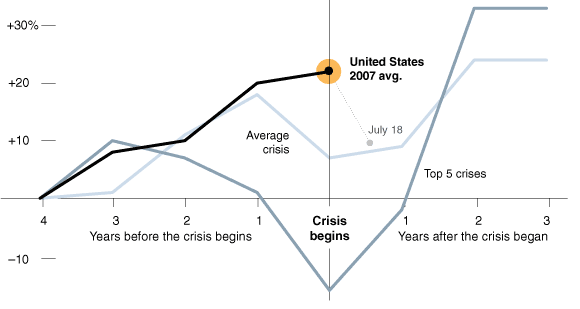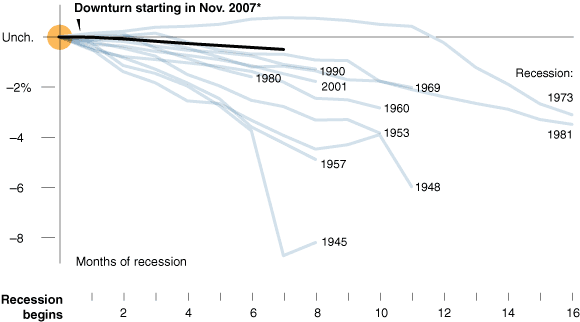1. There is likely to be a further 30% fall in housing prices, before the recovery starts somewhere in 2011. According to the Case-Shiller index, house prices rose 70% in the 2000-06 period, before falling by 17% last year, but is still 30% above 2000 level.
2. Unlike many of the previous recessions, which were engineered by the Fed to control inflation, the present one is a result of a dangerously unbalanced and even insolvent financial system and global rise in commodities and energy prices. This leaves the government and the Fed with limited policy levers to significantly influence the direction of policy making.
3. The return to normalcy will be a prolonged period of flat or at best slowly improving performance, rather than a V-shaped rebound. There is likely to be a long period of sluggish economic growth and rising unemployment that would appear to most Americans like a continued recession. By this pattern, the economy will stay depressed till atleast 2010 or 2011.
He also has prescriptions for the new President - a bigger and sustained fiscal stimulus (Jason Furman's role will be interesting if Obama comes to power) and social security cushions like universal health care.
The NYT has this interesting graphic and analysis, drawing on the work of Carmen Reinhart and Kenneth Rogoff, that predicts further 15% fall in home prices over the next three years, stock markets falling throughout 2009, and atleast four times more job losses than now and falling well past 2009.



Economists like Nouriel Roubini, who as early as 2005 predicted the sub-prime bubble collapse followed by a recession, warns that the mortgage excesses are only a part of the mess that the US financial markets are currently embroiled in. He argues that thanks to excesses in credit cards, auto loans, corporate and municipal debt, the banks and other financial institutions will require much more squaring up of their balance sheets. The great unravelling has only started and in all the losses could reach $2 trillion.
The resultant credit squeeze could be staggerring and painful. And it will require a more proactive and internventionist, big government to cushion Americans from the adverse impact of these hard times. As Paul Krugman writes, the Democrats are ideologically and historically best placed to administer such policies.
No comments:
Post a Comment